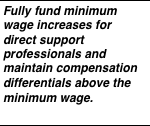We fully support the Governor’s proposal to increase the minimum wage to $15 per hour. However, as the State Comptroller’s analysis states: “The Executive Budget provides no additional funding to help nonprofit agencies or other State contractors absorb the costs of  increasing the minimum wage to $15 per hour.” In year one of the phased increase, developmental disability provider associations have calculated the budget shortfall to fund needed increases in direct support professional (DSP) salaries at $270 million (state share of $135 million). The current budget proposal must include these dollars. Additional resources must also be allocated throughout the scheduled minimum wage increases.
increasing the minimum wage to $15 per hour.” In year one of the phased increase, developmental disability provider associations have calculated the budget shortfall to fund needed increases in direct support professional (DSP) salaries at $270 million (state share of $135 million). The current budget proposal must include these dollars. Additional resources must also be allocated throughout the scheduled minimum wage increases.
A failure to address this gap can have disastrous consequences for the quality of supports and program continuity. In addition, DSPs currently earn slightly more than the current minimum wage; failure to maintain that wage differential for these essential and demanding jobs will increase already unacceptably high vacancy rates and disproportionate training costs, further eroding the quality of supports provided to persons with intellectual and developmental disabilities. Since over 90% of revenues to the affected agencies come from state contracts, significant budget gaps will drive workforce reductions and seriously endanger the viability of many agencies across the state.
A report produced for OPWDD on DSP Credentialing surveyed compensation for DSPs and their supervisors. This report surveyed average wages and ranges at 206 agencies and detailed the relative wages in neighboring human services fields and the cost of consequent high staff turnover:
“Among New York’s private providers in the DD sector of LTSS [Long Term Supports and Services], the average adjusted DSP wage of $13.25 is significantly less than workers providing direct support in other human service sectors in New York. For example nurse assistants that typically work in the elder service sector of LTSS have an average wage of $15.87 per hour while entry-level aides and technicians in the behavioral health sector make on average $15.36 (PHI, 2013). Without adjusting rates… many DSPs will remain the working poor with income so low that half qualify for means-tested benefits such as food stamps. This leaves tenured DSPs with few incentives or opportunities to advance their knowledge and skill and to remain in the field leading to continued insufficiency and instability of this crucial workforce.”
By comparison, starting salaries in OPWDD state-operated community residences are the equivalent of $14.64/hour. But the average starting wage in DSPs for non-profit agencies surveyed is $10.84/hour.
In New York’s private sector of providers in the I/DD field, the DSP turnover rate averaged 28.8%. This means that in a calendar year 28,046 of the estimated number of the known 97,382 DSPs employed by private providers in NY will leave their positions within the first year. Annual turnover costs in the I/DD sector alone are conservatively estimated at $79,804,549. Reducing turnover by 10% would save the system $7,980,618 each year.
These are only the fiscal costs of low wages and high turnover: the human cost is an unending stream of new faces and the loss of sustaining relationships for people who require complex supports and are deserving of sensitive care.
